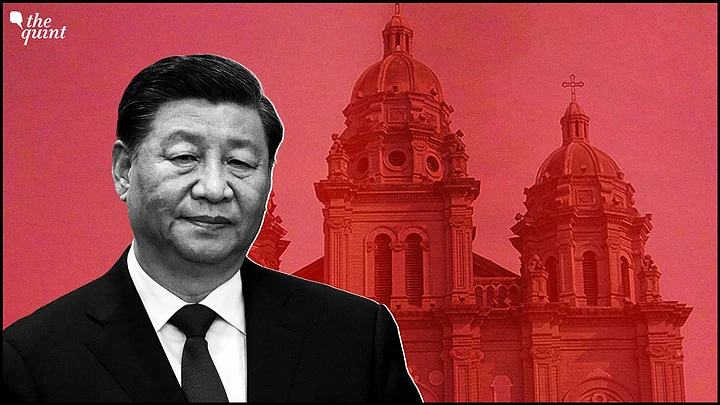More than a wolf warrior, China is a champion of lies and deceit. Just a few days after announcing Chinese names for eleven geographical features in Arunachal Pradesh, it has decided to go against the Vatican and violate once more the Agreement on Episcopal Appointments signed with the Holy See in 2018 (renewed twice, most recently last fall).
The exact content of the Agreement on Episcopal Appointments has never been published, but it is understood that the key point was that both Beijing and the Vatican were given a say in appointing Catholic bishops in China.
After the Agreement, only six bishops have been appointed and, as critics have pointed out more than once, restrictions on religious freedoms in China for Christians and other religious minorities have been increasing.
The violation this time is a major one because the Chinese Council of Bishops, a body not recognized by the Holy See and a direct emanation of the Chinese Communist Party, made the appointment of the bishop of Shanghai, the country's most important diocese.
Every Catholic Body is a Proxy of the Chinese Communist Party
Apparently, The Holy See was informed “a few days ago” of the decision by China to transfer Bishop Shen Bin from Haimen in Jiangsu province to the diocese of Shanghai, the Vatican said on Tuesday. It added that it had learned of his official installment earlier in the day from the media.
“For the moment, I have nothing to say about the Holy See’s assessment of the matter,” Matteo Bruni, director of the Holy See Press Office, said. AsiaNews, a Catholic news agency, said that Shen was appointed by the Council of Chinese Bishops, which he himself heads. The Council is not recognised by the Vatican and is controlled by the Chinese Communist Party.
The bishopric of Shanghai had been vacant for 10 years since the death of the late bishop Jin Luxian in April 2013. The Holy See has said that the city’s auxiliary bishop, Ma Daqin, should administer the diocese, but he has been under house arrest since 2012 when he publicly rejected the Chinese Catholic Patriotic Association – the Communist body that governed the local Church.
The last row between Beijing and Rome dates back to last November, when John Peng Weizhao, bishop of Yujiang (Jiangxi province), was appointed as 'auxiliary bishop of Jiangxi,' a diocese not recognized by the Holy See.
According to a statement issued back then by the Holy See: "The civil recognition of Msgr. (Monsignor) Peng was preceded, according to reports, by long and heavy pressure from the local Authorities." Thus, "the Holy See hopes that similar episodes will not be repeated, remains awaiting appropriate communications on the matter from the authorities, and reaffirms its full readiness to continue respectful dialogue concerning all matters of common interest".
Gradually But Surely Silencing the Vatican
The tone was very harsh, considering that until then Rome had chosen to keep a low profile, negotiating with lights off and avoiding even commenting officially on the arrest and sentencing of Cardinal Joseph Zen, bishop emeritus of Hong Kong who has always fought against any form of understanding with the Beijing regime.
Cardinal Zen had actually warned that the Agreement, the content of which is still a secret, would only make evident the imbalance in relations as China would inevitably silence the Holy See. And in fact, not a word was uttered about the demonstrations in Hong Kong and their repression. There was neither a message from the Pope at the Angelus, nor a general audience sent to those fighting for freedom.
And when Pope Francis did say a few words about the Uyghurs, recalling their persecution, he was immediately put in his place by the Chinese Foreign Ministry: "His statements are based on nothing. All ethnic groups in the country enjoy the full right to survival, development, and religious freedom." End of the story.
But this is what usually happens when one tries to strike deals with Beijing, thinking maybe that the situation of Catholics in China will or could be different from, for example, the situation of Tibetian Buddhists.
Bishops installed by Beijing have to swear: "to keep God's commandments, fulfill the pastoral duties of the auxiliary bishop, faithfully preach the gospel, lead the priests and faithful of Jiangxi diocese, abide by the national constitution, safeguard the unity of the homeland and social harmony, love the country and religion and persist in the principle of independent and self-governing churches, adhere to the leadership of my country's Catholicism in China, actively lead Catholicism to adapt to socialist society and contribute to the realization of the Chinese dream of the great rejuvenation of the Chinese nation."
Does it sound familiar? It is what Beijing-installed Lamas have to swear, and what brainwashed Uyghurs have to learn, that there's no God except Xi Jinping, no moral authority bigger than his own. The strategy of the Communist Party of China is the same for all minorities, and Rome should finally understand and acknowledge it.
(Francesca Marino is a journalist and a South Asia expert who has written ‘Apocalypse Pakistan’ with B Natale. Her latest book is ‘Balochistan — Bruised, Battered and Bloodied’. She tweets @francescam63. This is an opinion piece and the views expressed are the author's own. The Quint neither endorses nor is responsible for his reported views.)
(At The Quint, we question everything. Play an active role in shaping our journalism by becoming a member today.)
